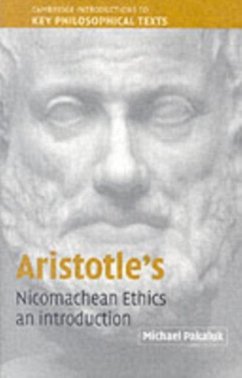This is an engaging and accessible introduction to the Nicomachean Ethics, Aristotle's great masterpiece of moral philosophy. Michael Pakaluk offers a thorough and lucid examination of the entire work, uncovering Aristotle's motivations and basic views while paying careful attention to his arguments. The chapter on friendship captures Aristotle's doctrine with clarity and insight, and Pakaluk gives original and compelling interpretations of the Function Argument, the Doctrine of the Mean, courage and other character virtues, Akrasia, and the two treatments of pleasure. There is also a useful section on how to read an Aristotelian text. This book will be invaluable for all student readers encountering one of the most important and influential works of Western philosophy.
Dieser Download kann aus rechtlichen Gründen nur mit Rechnungsadresse in A, B, BG, CY, CZ, D, DK, EW, E, FIN, F, GR, HR, H, IRL, I, LT, L, LR, M, NL, PL, P, R, S, SLO, SK ausgeliefert werden.

